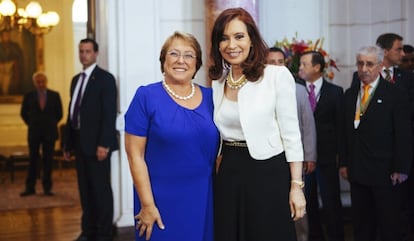Bachelet takes office for second term as Chile’s next president
Education reform and introducing same-sex marriage seen as her greatest challenges


Michelle Bachelet is scheduled to be sworn in later on Tuesday as Chile’s next president, taking over a nation that has had solid growth for the past four years.
This will be the second term for the 62-year-old Socialist, who won the presidential elections on December 15 by a wide margin.
While Chile has had a robust economy with a “stable democracy with citizens empowered by their personal guarantees,” as she has stated, it is also a nation where great disparities exist. Bachelet has pledged to eradicate inequalities, especially in education where students have demanded that the national system be restructured so that the lower classes have access to private universities.
Along with the challenges she faces, her incoming administration has already been plagued by scandal: four of her proposed Cabinet members have had to quit before assuming office. On Saturday, Bachelet, who served as Chile's first female president from 2006 to 2010, accepted the resignation of Carolina Echeverría, who was her candidate to become deputy defense minister when questions surfaced about her links to repression during the past dictatorship of Augusto Pinochet. Her father, Víctor Echeverría, had been accused of torture during the past regime.
At the beginning of February, Claudia Peirano also withdrew her candidacy as deputy education minister after students protested when she came out against a government proposal for a free education system.
Four of her proposed Cabinet members have had to quit
Hugo Lara, who was poised to take the role of deputy agriculture minister, also stepped down when he was charged with tax crimes, while Miguel Moreno, designated as deputy secretary of national heritage, was accused of indecently assaulting a woman on the subway.
Education reform will be one of Bachelet’s most challenging tasks during her second term. Since 2011, students across Chile have held infrequent protests – some of which have been violent – to demand changes in the system. The wealthy and privileged generally have access to good education at high-school level, which allows them to pass college entrance exams and study at one of Chile's top two public universities. Other Chileans must pay high tuition fees to enter private universities, which are less prestigious than the public ones.
In the 20 years since the return to democracy no president has managed to successfully reform Chile's education system, which reflects some of the greatest inequalities that exist in the country. Bachelet has said that she wants to introduce government subsidies and scholarships for low-income students who want to attend the private universities. But to finance her proposal, she will have to raise taxes, which will be an unpopular move.
Another of her campaign promises that will also test the tolerance of conservative Chileans will be to introduce same-sex marriages. Argentina and Uruguay are the only two South American nations where homosexual matrimony is permitted.
Bachelet will be sworn in on Tuesday before a special congressional session in Valparaíso, in which Spain will be represented by Prince Felipe.
Tu suscripción se está usando en otro dispositivo
¿Quieres añadir otro usuario a tu suscripción?
Si continúas leyendo en este dispositivo, no se podrá leer en el otro.
FlechaTu suscripción se está usando en otro dispositivo y solo puedes acceder a EL PAÍS desde un dispositivo a la vez.
Si quieres compartir tu cuenta, cambia tu suscripción a la modalidad Premium, así podrás añadir otro usuario. Cada uno accederá con su propia cuenta de email, lo que os permitirá personalizar vuestra experiencia en EL PAÍS.
¿Tienes una suscripción de empresa? Accede aquí para contratar más cuentas.
En el caso de no saber quién está usando tu cuenta, te recomendamos cambiar tu contraseña aquí.
Si decides continuar compartiendo tu cuenta, este mensaje se mostrará en tu dispositivo y en el de la otra persona que está usando tu cuenta de forma indefinida, afectando a tu experiencia de lectura. Puedes consultar aquí los términos y condiciones de la suscripción digital.








































